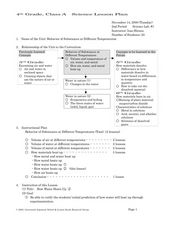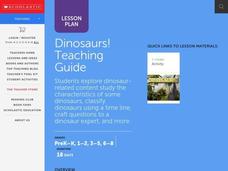Curated OER
Solar Sweet Tea
Students study the sun. For this heat energy lesson, students use the sun's warmth to make tea. They place a few jars with tea bags and water in the sun and discuss what the sun is doing to the water while they wait for the tea to brew....
Curated OER
Ecology
Learners explore, experience and experiment identifying the human impact on the environment of vegetative differences within the same biome. They assess what causes deserts, rain forests, savannahs, tundras and saguaros and how these...
Curated OER
Sort the Compost Bin
Students discover what compost is. In this composting lesson, students view a sample of a compost bin and define what the purpose of compost is. Students discuss what the compost bin consists of and sort the compost bin into the green...
Curated OER
Recognizing Litter
When does trash become litter? Use this litter awareness lesson to help them understand the importance of trash disposal. Get learners engaged by reading Nancy Loewen's Lady Lulu Liked to Litter (not included). After discussing what...
Lerner Publishing
Teaching Habitats
What makes up a habitat? Use this resource to engage first graders in the exploration of desert, wetland, forest, and ocean habitats. Youngsters classify plants and animals into the four distinct habitats through drawings and cutting and...
Los Angeles Unified School District
River Systems
Scholars must react to the ecosystems of a river. They use inquiry-based learning along with maps and visuals to better understand the impact of rivers on everyday life. To finish, they create final written projects and presentations.
Curated OER
Ocean Life
Mini-marine biologists use Scholastic Explorers website to learn about declining numbers of leatherback sea turtles and dusky dolphins. They fill out a K-W-L chart and observation journal worksheet, which are both provided in the lesson...
Curated OER
The Bulbs: Camas and Daffodil
Fourth graders become aware of the importance of the camas bulb to the Nez Perce people, they learn the parts of plants, and gain understanding of the interdependence of Nature. They study about the possible causes and outcomes of global...
Curated OER
Rx Rainforest:
Students identify plant diversity in the rainforest and the role that animals and habitats play in scientific research. They differentiate between natural habitat and laboratory research and work collaboratively to produce a video news...
Curated OER
What's In The Forest?
Students examine forest food chains and create a forest habitat in the classroom. They are introduced to the concept of interdependence in Nature. They define a simple forest food chain and develop inquiry process skills.
Curated OER
The Wonderful World of Polymers
Seventh graders investigate the concept of polymers. They discover unique properties and how polymers are natural. The lesson contains sufficient background information for the teacher. Students examine different types of materials and...
Curated OER
Fly Tying
Students practice fly tying and explain water conservation efforts in Iowa. In this ecology, Iowa geography, and natural resources lesson, students identify basic equipment and material needed to fish, then tie flies. Students name...
Curated OER
The Greenhouse Effect
Seventh graders investigate the temperature change in open and closed containers. In this earth science lesson, 7th graders relate this lab activity to greenhouse effect. They create a line graph from data collected in the experiment.
Curated OER
Inquiring Minds Want To Know
Eighth graders conduct a scientific experiment that help them explain the concept of nature versus nurture.
Curated OER
CSI, Second Grade Style
Second graders conduct a classroom investigation. In this investigative lesson plan, 2nd graders spend their time observing, measuring, and collecting data. They simulate a forensic science lab by conducting a fingerprint, scent,...
Curated OER
What it means to be a scientist and What is the Scientific Process?
Learners read an article and describe the scientific method. In this scientific process lesson, students compare basic science and applied science. Learners discuss ideas such as team work, application of an idea, how scientists...
Curated OER
Critter Museum
Students act as directors of a new science museum where they have decided to set up a display of animals without backbones that are found in the area. To organize their display, they need to sort and classify a collection of animals and...
Curated OER
Solids, Liquids, and Gases
Students explore the three main forms of matter: solid, liquid, and gas. They examine concrete examples of each, using their five senses and "experimenting" to find differences in them. They find pictures of each, cut them out and past...
Curated OER
Phytoremediation
Students participate in a lab designed to facilitate the clean up and remove of substances ranging from heavy metals to dynamite. They focus on the remediation of copper. They discuss their results of this open ended inquiry experiment.
Curated OER
Exploring the Beach
Students explore the beach. In this marine habitat lesson, students inspect sand grains, design beach profiles, classify marine life, and examine natural beach habitats. Students use spreadsheets to record data from their activities at a...
Curated OER
Dogs & Darwin
Ninth graders construct and conduct a laboratory experiment illustrating the transfer of mutations. They compare and contrast natural selection in organisms with long and short reproductive cycles.
Curated OER
How Water Heats Up
Fourth graders conduct experiments heating water. For this inquiry-based early chemistry lesson, 4th graders use the materials given to experiment with the process of heating water. Students draw conclusions based upon their findings...
Curated OER
Dinosaurs
Students will develop goals for inquiry. They will also improve content area reading and research skills. The context of studying dinosaurs will help learners to distinguish from organisms that live presently and those from the past...
Curated OER
Mother Earth
Students compare natural and human made items and gain an awareness of the importance of Mother Earth to the Nez Perce people.

























